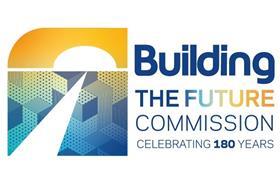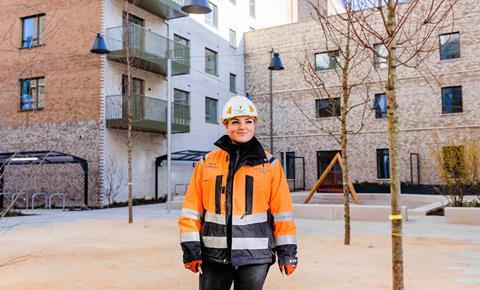The industry includes an impressive range and variety of roles 鈥� but unless you are on the inside it can be hard to know how to break in, let alone progress to the top. In this new series, we talk to professionals about their often surprising career twists and turns


How long have you been working and what is your current job?
I have been in construction since age 17. My current job role is trainee building manager at Willmott Dixon, working on the huge Gascoigne neighbourhood regeneration that has seen my company build over 500 homes in Barking.
What were your first career ambitions? (Would your 16-year-old former self be surprised at what you鈥檙e doing now?)
When I was in primary school, I used to dream of being either an environmental health officer or a hairdresser called Molly 鈥� because I hated my name.
When did you first start thinking about a career in construction and why?
I first considered construction when I was 16 because my grandad had his own roofing company, which he started after the Second World War. I would dream that one day I would take it over.
Who or what helped you get where you are today?
My mum was the main person that helped me in starting in construction as one of her colleagues was looking to take a younger person on in customer service but couldn鈥檛 find anyone that was interested in the role.
Did your choice of subjects/qualifications in education help or hinder you getting a job in the sector?
I chose fine art in college, which has no relevance to my role today.
Have you had to overcome any other barriers to get where you are today?
I have always struggled with anxiety and my confidence levels since I was very young. Construction is regarded as a tough industry 鈥� that was the perception, but not the reality I find now.
I have had to overcome my fears of making mistakes and being left out of certain situations. I believe, since working in construction, I am a more confident than I was and it has given me huge self-belief in my capabilities.
I have also had some wonderful mentors to help grow my confidence and I am passing this learning onto others joining the industry.
What do you know now about the industry that you wish you knew when you were at school?
I wish I knew more about the different types of job roles the construction industry offered and that it is OK for a female to apply to work within a trade and not just the office.
What surprised you about the industry as a new starter?
When starting on site, I was surprised at how many people are involved in building a project. The sheer number of tradespeople and stakeholders involved means it is really important to make sure everyone is aligned together with a clear direction and common sense of purpose.
What are the best and hardest bits of your job?
The best part is knowing that, when a problem has come to light, that I and my team have been able to assist with solving it. Watching the project as it comes to an end is incredibly satisfying, especially when you can see the huge impact it is having on the lives of people who have been able to move into the new homes we鈥檝e built and benefit from what we have created.
The hardest part of my job is that you have to know the project like the back of your hand, to understand the risks, complexities and enormous detail. It is a team effort and I enjoy working with, and learning from, my Willmott Dixon colleagues and also our fantastic supply chain partners.
For someone coming through the school system now, what advice do you have about choosing a construction-related career?
Join the industry through an apprenticeship if you don鈥檛 have any prior qualifications! This is the best way to start as you will be studying and working at the same time, but it also lets you gain experience on site/in the office while working towards a qualification.
That鈥檚 why is so important. It鈥檚 a gateway to a new generation to see our industry, learn what we do and the positive impact we have on so many lives, and be inspired to follow suit!
I鈥檓 really keen to play my part here and regularly support tours for young people living in Barking. I am very proud of what I do and my industry, and Open Doors is the shop window we need.
It also provides a structured follow-up with information provided advising visitors 鈥� especially young people and students 鈥� on finding careers to suit their interests (such as ) and how they can get entry level positions in the industry.
What one thing would you change to make finding a career in the built environment sector easier?
There needs to be more advertising and more school talks and workshops which can give students an insight into what to expect and what roles are available. Open Doors is only one week but this is a year-long process to attract new talent.
I think more companies should list their entry level positions on 鈥� it鈥檚 an excellent tool that did not exist when I entered the sector, and benefits from having thousands of Open Doors visitors sent to it every year, to follow through on their interest.

Open Doors Week, 18-23 March, 2024
Recruiting the next generation is a priority if we are to maintain the pipeline of talent coming into the industry. One of the best ways to showcase what construction has to offer is Week. You, too, can get involved:
- Promote Open Doors events in your local area
- Show your support on social media using #OpenDoors24
- List all your new entrant vacancies on
Open Doors has a of recruiting new entrants into the industry. With your help we can make 2024 the biggest event yet!























No comments yet